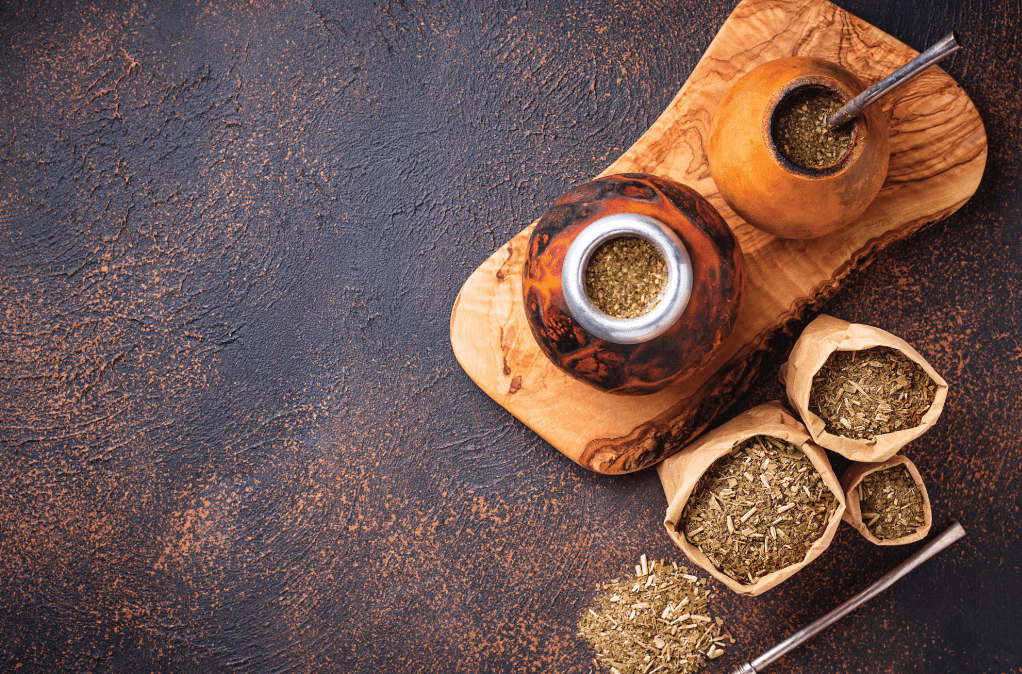What is yerba mate?
Hailing from South America and wildly popular in Argentina and Uruguay, yerba mate is a strong herbal tea. It’s made from the Ilex paraguariensis evergreen holly plant’s twigs and leaves. This plant is wild but also grows on plantations, and its leaves are dried over fire and steeped to become tea.
The traditional yerba mate drink is a cultural symbol widely enjoyed in many social situations. It’s typically poured into and consumed from a gourd – drinking it this way is considered a sign of friendship. But, then again, yerba mate is more than just a medium for socializing. [This article, “Yerba mate is an Elixir. It Delivers on These 9 Incredible Health Benefits” was originally published in News7Health]
Yerba mate nutrition
Each cup of yerba mate contains about 3 grams of carbohydrates, ½ a gram of protein, and 15 calories. Yerba mate contains no fat, sugar, or fiber, and it’s a great source of antioxidants, vitamin C, zinc, and magnesium. Yerba mate is a nutritional powerhouse.
Top health benefits of yerba mate tea
The yerba mate drink comes with plenty of health benefits, including the following.
1. Antioxidant and nutrient provider
Several plant nutrients and antioxidants are found in yerba mate, such as:
- Caffeoyl derivatives – the mate tea’s main antioxidants.
- Xanthines – these behave like stimulants and include caffeine and theobromine.
- Polyphenols – antioxidants that help reduce the risk of contracting several diseases.
- Saponins – bitter compounds that help to reduce cholesterol and inflammation.
As well, the tea can have almost every mineral and vitamin plus 7 of 9 essential amino acids you need.
2. Focus and energy booster
A cup of yerba mate contains about 85 mg of caffeine which can help raise your energy and aid with focus and concentration, thanks to its effect on your brain. People tend to love the alertness and physical energy they get from mate tea but without negative side effects like anxiety or jitters associated with coffee and coffee-based beverages..
3. Physical performance enhancer
Since caffeine lessens fatigue, improves muscle contractions, and boosts athletic performance and the yerba mate drink contains plenty of it, you could expect your physical performance to rise with regular consumption. In this way, yerba mate is the folk version of a sports drink.
This is shown even further through a study that found people who took one gram of yerba mate leaves immediately before mid-intensity exercise burned nearly 25% more fat than usual. The reason for this is yerba mate raises your body’s dependence on fat to fuel exercise, which saves the carbs needed for harder, high-intensity moments like sprinting or uphill cycles. Yerba mate is an excellent pre-workout preparation.
4. Mental health support
A decrease in mental health issues like depression, mood disorders, attention problems, substance abuse, and eating disorders has been found in some people who drink yerba mate. While this is largely anecdotal and needs further research and controlled experimentation, yerba mate is a plant with promise for mood disorders, and perhaps even for some neurological issues.
5. Weight loss aid
Some studies have shown increased metabolism and decreased appetite (because of lowered fat cells) when yerba mate is consumed, both of which encourage weight loss. Another reason for these results is the fact that the tea also promotes more fat stored for energy burning, likely thanks to its high antioxidant and caffeine makeup. Yerba mate is a potential adjunct to the keto diet in some of its variations.

6. Infection avoider
Yerba mate can help prevent parasitic, bacteria, and fungi infections. This is shown through a study where yerba mate extract stopped E. coli bacteria (which causes food poisoning symptoms), along with the fact that yerba mate compounds protect us, at least somewhat, from intestinal parasites. Yerba mate is, in effect, a holistic antibiotic, with prophylactic potential.
7. Digestion and elimination promoter
Over the years, yerba mate has proven beneficial to those suffering from indigestion, diarrhea, and constipation. In fact, the drink fights against E. coli, a common food poisoning culprit, thanks to its antibacterial properties. As well, intestinal parasites are destroyed by one or more saponins in yerba mate tea.
8. Immunity booster and disease protector
Naturally-formed compounds in yerba mate, saponins, come with anti-inflammatory properties. This and the antioxidants in the tea’s vitamins C and E, plus zinc and selenium, boost the immune system’s strength, which means healthier outcomes for most people who take it. Once again, yerba mate is a rich source of essential nutrition.
For example, the tea may help to prevent certain cancers, liver diseases, high cholesterol, and cardiovascular problems, thanks to compounds like polyphenols and caffeoyl derivatives.
9. Blood sugar stabilizer
Studies have shown yerba mate tea can reduce diabetes complications. It’s been found to help lower blood sugar levels and improve the signaling of insulin. When regularly consumed after eating, the tea is thought to lower Hemoglobin A1c (average blood glucose levels over about 2-3 months).
How to consume yerba mate
There are different ways to enjoy yerba mate. For one, you can take steps to make your own mate tea as they’ve traditionally done for centuries in South America. Simply fill up the lower third of a gourd or calabash container with dried yerba mate leaves and add hot water. Enjoy the tea through a metal straw with a filter so that the leaf pieces can strain out.
Or, you can make it with a French press if you don’t own a traditional gourd or calabash container. Here’s how:
- Add 2 tablespoons of yerba mate into your French press filter.
- Slowly pour 16 oz of just-boiled water (at about 150℉) over the yerba mate, letting it soak through the filter.
- Brew for 4-6 minutes, to your preferred strength.
- Depress the plunger and serve (many people like lemon juice, milk, or burnt sugar to go with it).
Keep in mind, as with tea or coffee, the flavor and strength of yerba mate fluctuates depending on how you prepare it. You can enjoy the tea hot, cold, or as a latte with warm milk.

Alternative yerba mate energy drinks
If you’re not up for preparing the tea yourself, you can check out some pretty healthy and tasty alternatives from makers of plant-based, energizing, and healing drinks that combine rainforest peoples’ traditional knowledge with scientific research.
For example, AMAZ’s organic yerba mate sparkling tea is packed with nutrients and antioxidants that improve focus and energy, plus adaptogens that boost resilience to psychological and physical stress. With zero calories or sugar, the three flavors (lemon ginger, peach mango, and acai blueberry) contain 80 mg of caffeine per serving. In these mate iced teas, you’ll get all the health benefits above, great taste, and refreshment without having to spend the time and effort brewing the tea yourself (and waiting for it to cool off).
A great thing about mate-based energy drinks like these is they contain about 100 times more antioxidants and polyphenols than you’ll get in typical energy drinks. These are a wonderful, powerful alternative to some of the energy beverages available in the marketplace.

Side effects of yerba mate
While there are many health benefits to consuming yerba mate, and while yerba mate is generally quite safe in moderation (much like so many other things in life) there can also be some side effects associated with the drink. For example, you could experience the typical side effects of excessive caffeine consumption, like anxiety or nervousness, heart palpitations, and insomnia. Because of the high caffeine, the drink isn’t suitable for anyone who is breastfeeding or pregnant, or those with anxiety problems. Plus, yerba mate can behave like a laxative if too much is consumed.
On top of this, the drink has been found to increase risk of some cancers if you drink alcohol or smoke heavily. Studies have found that drinking large amounts of yerba mate over a long period can raise the risk of digestive tract and upper respiratory cancers, likely due to the polycyclic aromatic hydrocarbons and carcinogens it contains. As well, when consumed at high temperatures, the digestive tract and respiratory lining can get damaged, which increases the risk of cancerous cells. Again, yerba mate is a bit of a double-edged sword if consumed in excessive amounts, but it is generally considered safe, and quite beneficial, if ingested in moderation.
Yerba mate can also interfere with certain medications like drugs that activate the nervous system or treat asthma, cancer, depression, heart disease, or diabetes (though this is due to the caffeine content, not anything to do with yerba mate specifically). If you’re concerned or have questions, consult with your health care practitioner. Generally speaking, moderation is key.
Further Resources For Reference:
WebMD; Health benefits yerba mate
Scientific American; What are the health benefits of yerba mate
Mayo Clinic: Nutrition, healthy eating and yerba mate
Disclaimer
Important Note: The information contained in this article is for general informational purposes only, and should not be construed as health or medical advice, nor is it intended to diagnose, prevent, treat, or cure any disease or health condition. Before embarking on any diet or program of nutritional supplementation, it is advisable to consult your healthcare professional in order to determine its safety and probable efficacy in terms of your individual state of health.


